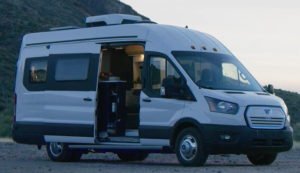Bloomberg: Van Life Goes Electric

The popularity of electric vehicles has not gone unnoticed by RV manufacturers, and there’s a strong push being made on many fronts to give consumers that option when it comes to purchasing their new RV. Bloomberg sent a reporter to find out what this might mean for consumers.
 A few weeks ago, at an RV industry showcase in Harper’s Ferry, West Virginia, I test drove an electric motorhome – a concept vehicle made by Winnebago Industries as it works on developing a commercial e-RV. More like a shuttle van with sleeping accommodations than a traditional motorhome, the concept e-RV can be charged in 45 minutes and can travel up to about 120 miles before needing a recharge.
A few weeks ago, at an RV industry showcase in Harper’s Ferry, West Virginia, I test drove an electric motorhome – a concept vehicle made by Winnebago Industries as it works on developing a commercial e-RV. More like a shuttle van with sleeping accommodations than a traditional motorhome, the concept e-RV can be charged in 45 minutes and can travel up to about 120 miles before needing a recharge.
I hopped into the driver’s seat and ratcheted it up to accommodate my short legs. Recalling the gray tank of my family’s Chevy Astro van circa 1992, I felt a twinge of anxiety. Then I started driving. It was a soundless, smooth ride.
Iridium debuted the first all-electric motorhome at a German trade show in 2019. Since then, the industry has raced to refine the concept. Camping and RVing, long popular in North America, now make up a $140 billion-a-year business, according to the RV Industry Association. RV makers say they were able to connect with a younger, more diverse demographic after the Covid-19 pandemic shuttered stores and offices in 2020 and everyone headed outside. Over the past two years, the typical first-time buyer of a recreational vehicle was a millennial between the ages of 33 and 41, with an average annual income of roughly $90,000, according to online surveys the group has conducted.
Click here to read the entire story from Kellie Lunney at Bloomberg.


